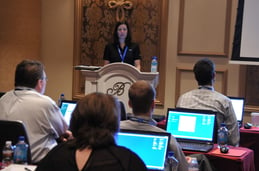 As with most specialized software programs, it is usually not suggested to implement SAP BPC without the assistance of a consulting partner. Many projects require expertise that most EPM administrators do not have, and so it is recommended to find a partner that can ensure success. Choosing this partner is an important decision. Here are a few of the top things a company should look at when deciding on an appropriate organization.
As with most specialized software programs, it is usually not suggested to implement SAP BPC without the assistance of a consulting partner. Many projects require expertise that most EPM administrators do not have, and so it is recommended to find a partner that can ensure success. Choosing this partner is an important decision. Here are a few of the top things a company should look at when deciding on an appropriate organization.
Experience
Perhaps the most obvious factor to research in a potential partner is their level of experience. If a company is run by veteran consultants, there is a higher likelihood for success than with one run by beginners. Real world experience cannot be replaced by research and books; having legitimate case studies and success stories should stand out as an impressive feature.
Here at Column5, we were created by key figures of OutlookSoft, the predecessor to BPC. We have been working on EPM for over ten years, allowing us to gather experience through hundreds of projects. This helps refine best practices and makes certain that even newer consultants at the company are learning tried and true methods.
Specialization
There are plenty of large consulting firms that offer services ranging across the board, but is this the best way to get the service that you are specifically looking for? We believe that specialized firms are the most effective way to get exactly what you need. For example, if you want to buy a high quality wine, you will not go to a neighborhood grocery store. Specialization brings quality. In the case of BPC, we think it is much more beneficial to work with a small firm that has EPM as its sole priority, rather than going to a huge firm that only has a couple people working on your needs.
Methodology
All consultancies will have a unique method of approaching your needs. Some, however, are more focused and organized than others. Find out if they are dedicated to keeping your project on time, within scope, and on budget. An easy way to get to the heart of this question is to ask about their project management methodology. Column5’s Program Management Office is recognized for making certain that our projects are successful. They are a required component of our consulting services, and are an extraordinary resource for our clients’ projects.
Learning Resources
 While working with the consulting partner, and after the project is completed, you want to be able to continue to learn and take over some of the responsibilities. For this reason, it is important that your partner offers learning resources. While it is the role of your consultant to make sure the project is completed successfully, it should also be their duty to start training employees to be more self-sufficient, and offer a plan to stay up-to-date on any changes to the system. This is a money saver over time, and creates more developed and qualified employees at your own workplace.
While working with the consulting partner, and after the project is completed, you want to be able to continue to learn and take over some of the responsibilities. For this reason, it is important that your partner offers learning resources. While it is the role of your consultant to make sure the project is completed successfully, it should also be their duty to start training employees to be more self-sufficient, and offer a plan to stay up-to-date on any changes to the system. This is a money saver over time, and creates more developed and qualified employees at your own workplace.
This is one of Column5’s key beliefs. Our EPM Academy is dedicated to providing flexible training to customers, including in-person workshops, personalized classes, and online coursework. We also offer the EPM Summit, a series of events that educate EPM users on important tasks and the latest updates, along with a variety of other resources.
Company Culture
It is likely that your company has a defined culture in the workplace. When considering partners, it is important to reflect on whether or not they will fit into this culture. Does the partner share your same viewpoints about the goals? How do they approach conflict? Are they willing to compromise? While this is technically an intangible thing to measure, it is one of the most important to consider. Projects can be derailed if consultants are unwilling to assimilate with your company.
Think Column5 might be the right partner for you? Speak to a representative today!
Related Blogs
New Features of BPC 10.x Upgrades
6 Reasons You Need an EPM Summit Annual Pass
Learning Resources for SAP BPC
Why EPM Checklists, Methodologies, and Fast Start Templates Ensure Success
Analytics, EPM, and Managed Service











